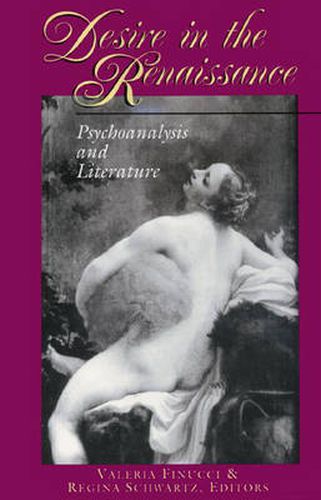Readings Newsletter
Become a Readings Member to make your shopping experience even easier.
Sign in or sign up for free!
You’re not far away from qualifying for FREE standard shipping within Australia
You’ve qualified for FREE standard shipping within Australia
The cart is loading…






Drawing on a variety of psychoanalytic approaches, ten critics engage in exciting discussions of the ways the ‘inner life’ is depicted in the Renaissance and the ways it is shown to interact with the ‘external’ social and economic spheres. Spurred by the rise of capitalism and the nuclear family, Renaissance anxieties over changes in identity emerged in the period’s unconscious - or, as Freud would have it, in its literature. Hence, much of Renaissance literature represents themes that have been prominent in the discourse of psychoanalysis: mistaken identity, incest, voyeurism, mourning, and the uncanny. The essays in this volume range from Spenser and Milton to Machiavelli and Ariosto, and focus on the fluidity of gender, the economics of sexual and sibling rivalry, the power of the visual, and the cultural echoes of the uncanny. The discussion of each topic highlights language as the medium of desire, transgression, or oppression. The section ‘Faking It: Sex, Class, and Gender Mobility’ contains essays by Marjorie Garber (Middleton), Natasha Korda (Castiglione), and Valeria Finucci (Ariosto). The contributors to ‘Ogling: The Circulation of Power’ include Harry Berger (Spenser), Lynn Enterline (Petrarch), and Regina Schwartz (Milton). ‘Loving and Loathing: The Economics of Subjection’ includes Juliana Schiesari (Machia-velli) and William Kerrigan ( Shakespeare ). ‘Dreaming On: Uncanny Encounters’ contains essays by Elizabeth J. Bellamy (Tasso) and David Lee Miller (Jonson).
$9.00 standard shipping within Australia
FREE standard shipping within Australia for orders over $100.00
Express & International shipping calculated at checkout
Drawing on a variety of psychoanalytic approaches, ten critics engage in exciting discussions of the ways the ‘inner life’ is depicted in the Renaissance and the ways it is shown to interact with the ‘external’ social and economic spheres. Spurred by the rise of capitalism and the nuclear family, Renaissance anxieties over changes in identity emerged in the period’s unconscious - or, as Freud would have it, in its literature. Hence, much of Renaissance literature represents themes that have been prominent in the discourse of psychoanalysis: mistaken identity, incest, voyeurism, mourning, and the uncanny. The essays in this volume range from Spenser and Milton to Machiavelli and Ariosto, and focus on the fluidity of gender, the economics of sexual and sibling rivalry, the power of the visual, and the cultural echoes of the uncanny. The discussion of each topic highlights language as the medium of desire, transgression, or oppression. The section ‘Faking It: Sex, Class, and Gender Mobility’ contains essays by Marjorie Garber (Middleton), Natasha Korda (Castiglione), and Valeria Finucci (Ariosto). The contributors to ‘Ogling: The Circulation of Power’ include Harry Berger (Spenser), Lynn Enterline (Petrarch), and Regina Schwartz (Milton). ‘Loving and Loathing: The Economics of Subjection’ includes Juliana Schiesari (Machia-velli) and William Kerrigan ( Shakespeare ). ‘Dreaming On: Uncanny Encounters’ contains essays by Elizabeth J. Bellamy (Tasso) and David Lee Miller (Jonson).